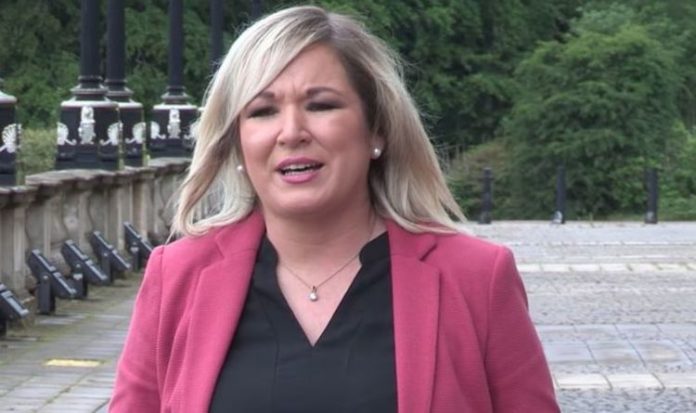Speaking to The Guardian’s Politics Weekly series with Jonathan Freedland, the Northern Ireland deputy first minister claimed both Brexit and coronavirus are pushing people from all sides of the political spectrum to have healthy conversations about the collapse of the UK and the possibility of a United Ireland. The Sinn Féin chief argued that even those who identify as unionists are now engaging in such conversations.
She warned: “Brexit is the clearest demonstration of the blatant disregard that the British Government have for the people here.
“There isn’t anything good for us here in terms of Brexit. We voted to reject Brexit.
“But it demonstrates for people, and not just those of a nationalist prospective or a republican prospective, it demonstrates to all people including those in the unionist community, that the British Government do not prioritise their needs and they’re not putting their interests first.
“So what I want and what our intention is, is to continue the debate.
READ MORE: Boris Johnson loses the trust to deliver post-Brexit trade deals
“And I can tell you this: in my whole lifetime I have never witnessed the level of conversation that is now underway right across this island.
“And it’s not just the national republicans talking about it.
“Many, many others are entering into the conversation and that is a really healthy and good thing.”
She added: “But also COVID-19. With Boris Johnson’s strategy in terms of COVID-19, we would have lost a lot more people we have if the executive did not have the ability to take its own path.”
Sinn Féin took home 37 seats in February’s general election, only one fewer than the Fianna Fail — which had been the main opposition party — and two more seats than Fine Gael, which had been in Government since 2011.
This increase of 14 seats since the last election meant Sinn Fein had secured a historic result for the party.
Sinn Féin leader Mary Lou McDonald even described the outcome as “something of a revolution in the ballot box”.
When all the first preferences were counted, the left-wing republican party had 24.5 percent of the vote, while Fianna Fail had 22 percent and Fine Gael just 21 percent.
It was the first time in close to a century that neither of the main two parties, Fianna Fail or Fine Gael, had won the most votes.
Ray Bassett, Ireland’s former ambassador to Canada, Jamaica and the Bahamas, said Boris Johnson’s arrival in Number 10 rapidly disabused Fine Gael leader Mr Varadkar and deputy, Simon Coveney, out of their assumption that a no deal Brexit would never be permitted in Westminster.
DON’T MISS:
Brexit LIVE: Farage predicts what Brexit will look like on Jan 1 [LIVE BLOG]
Fishing fury: MP urges ban on supertrawlers plundering UK waters [INSIGHT]
Nicola Sturgeon’s attempts to keep Scotland linked to Brussels blocked [ANALYSIS]
Writing in his new book, Ireland and the EU Post Brexit, Mr Bassett highlighted what he argues is the “folly” of Ireland “hitching its wagon” to the Backstop plan, a mechanism aimed at preventing a hard border between Ireland and Northern Ireland by tying the UK to some of the EU’s rules and regulations indefinitely.
He said: “Fortunately the Irish Government, late in the day, realised that their strategy would not work and undertook a radical U-turn.
“Up to that point, the Irish Taoiseach Leo Varadkar had been a loyal son of Brussels, throughout the Brexit negotiations.
“In contrast among Brexiteers in Britain, Varadkar and his chief lieutenant Simon Coveney have shouldered much of the blame for the intransigence and arrogance which has been associated with the EU.
“Polls in the UK consistently showed that Varadkar was blamed by many for the long and frustrating impasse.”
Mr Bassett suggests Mr Varadkar and Mr Coveney had been happy to go along with such a perception, “coupling it with a hefty dose of old-fashioned Anglophobia”.







